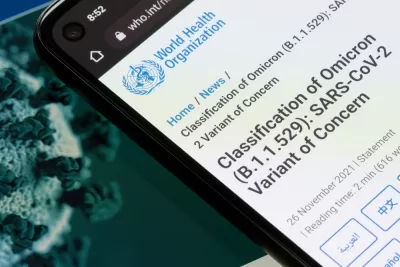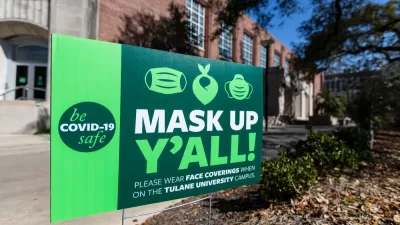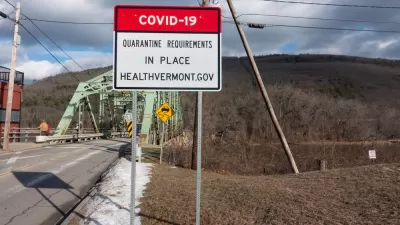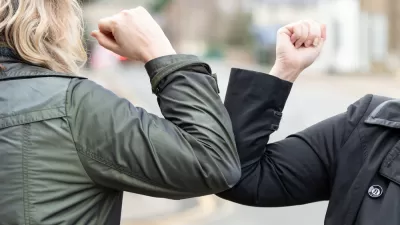The discovery by South African scientists will enable the world to prepare for the newest coronavirus variant, but it will also cause enormous hardship due to the travel restrictions on flights to/from eight nations in southern Africa.

"Scientists in South Africa on Thursday identified a concerning new coronavirus variant with mutations that one scientist said marked a 'big jump in evolution,' prompting several countries to quickly limit travel from the region," reported The New York Times on Nov. 25.
“This variant did surprise us, it has a big jump in evolution, many more mutations than we expected, especially after a very severe third wave of Delta,” said Tulio de Oliveira, director of the KwaZulu-Natal Research and Innovation Sequencing Platform.
On Friday, the World Health Organization declared the variant, heretofore called B.1.1.529, a 'variant of concern' (see chart on their Tracking SARS-CoV-2 variants webpage), "its most serious category — the first since the Delta variant, which emerged a year ago," reports the Times on Nov. 26.
The designation means that the variant has mutations that might make it more contagious or more virulent, or make vaccines and other preventive measures less effective — though none of those effects has yet been established.
WHO assigned it the 15th letter of the Greek alphabet, Omicron.
"Preliminary evidence suggests an increased risk of reinfection with this variant, as compared to other VOCs. The number of cases of this variant appears to be increasing in almost all provinces in South Africa," according to the WHO classification statement on Nov. 26.
Travel Restrictions
"As a precautionary measure until we have more information, I am ordering additional air travel restrictions from South Africa and seven other countries," said President Biden in a statement on Friday. "These new restrictions will take effect on November 29 [Monday]."
Six of the seven countries in Southern Africa share borders with South Africa: Botswana, Zimbabwe, Namibia, Lesotho, Eswatini (aka Swaziland) and Mozambique. Malawi, which borders Mozambique, makes seven. [See map].
However, U.S. was not alone in restricting flights to the region.
"Nations in southern Africa protested bitterly on Saturday as more of the world’s wealthiest countries cut them off from travel, renewing a debate over border closures from the earliest days of the coronavirus pandemic and compounding the problems facing poorly vaccinated countries," reported Benjamin Mueller, a health and science reporter for The New York Times and Declan Walsh, the Times chief Africa correspondent on Nov. 27 in the source article.
One nation after another shut its doors to southern Africa even as they spurned public health measures that scientists said were far more urgently needed to take on the new variant.
The cascade of travel closures triggered a wave of resentment among Africans who believed that the continent was yet again bearing the brunt of panicked policies from Western countries, which had failed to deliver vaccines and the resources needed to administer them.
The sense of outrage was most visceral in South Africa, where business leaders predicted a dire economic toll, especially on tourism.
"South Africa's President Cyril Ramaphosa said on Sunday that his government was considering imposing compulsory COVID-19 shots for people in certain places and activities, and he slammed rich Western countries for what he called their knee-jerk imposition of travel bans," reported Reuters on Nov. 28.
"The prohibition of travel is not informed by science, nor will it be effective in preventing the spread of this variant," Ramaphosa said. "The only thing (it) ... will do is to further damage the economies of the affected countries and undermine their ability to respond to ... the pandemic."
Criticism
"Travel restrictions may play a role in slightly reducing the spread of COVID-19 but place a heavy burden on lives and livelihoods,” said Matshidiso Moeti, WHO’s regional director for Africa, reported the Associated Press.
“If restrictions are implemented, they should not be unnecessarily invasive or intrusive, and should be scientifically based, according to the International Health Regulations, which is a legally binding instrument of international law recognized by over 190 nations.”
Mueller and Walsh noted that "[s]cientists worried that the restrictions would discourage other nations from reporting variant cases, out of fear of being slapped with travel bans." Moeti appeared to recognize that possibility in her statement that appeared in the AP.
"The speed and transparency of the South African and Botswana governments in informing the world of the new variant is to be commended,” said Moeti. “WHO stands with African countries which had the courage to boldly share life-saving public health information, helping protect the world against the spread of COVID-19.”
The non-profit U.S. Travel Association, which represents the travel industry, urged President Biden to reconsider the traves restrictions in a statement on Sunday.
“The U.S. Travel Association respectfully urges the Biden administration to revisit the reinstatement of country-specific entry bans in the near term.
“Covid variants are of concern, but closed borders have not prevented their presence in the United States while vaccinations have proven incredibly durable. That is why America’s travel industry is a vocal proponent of everyone getting a vaccine. With a vaccine and testing requirement in place to enter the U.S. [since Nov. 8] we continue to believe that assessing an individual’s risk and health status is the best way to welcome qualified global travelers into the United States.”
However, public health expert, Leana S. Wen, noted in her column in The Washington Post on Monday that those 'vax and test requirements' don't apply to arriving U.S. citizens, who also won't be affected by Biden's restrictions. While Wen supported travel restrictions as "a necessary move," she warned that "it’s not nearly enough to prevent the worst-case scenario: another virus surge that sets the United States back in our pandemic recovery."
The Biden administration should set up quarantine facilities and require returning Americans [from southern Africa] to isolate for at least five days and then get a repeat test.
Jennifer Nuzzo, an epidemiologist at Johns Hopkins University, added her skepticism in the source article, warning that "travel bans created a false sense of security, giving cover to elected leaders who wanted to avoid more difficult choices."
“The notion of having a global map of where the variants are and aren’t is just fantasy,” she said. “I don’t think the travel bans really have much of an impact, other than answering the political pressures that inevitably arise when a new variant emerges.”
Related in Planetizen:
- EU to Bar Travelers from U.S. and other High-Infection Countries, June 29, 2020
- Pandemic Reversal: The New Tri-State Quarantine, June 25, 2020
- State and Local Border Restrictions Draw Legal Scrutiny, April 20, 2020
FULL STORY: As Omicron Variant Circles the Globe, African Nations Face Blame and Bans

Trump Administration Could Effectively End Housing Voucher Program
Federal officials are eyeing major cuts to the Section 8 program that helps millions of low-income households pay rent.

Planetizen Federal Action Tracker
A weekly monitor of how Trump’s orders and actions are impacting planners and planning in America.

Ken Jennings Launches Transit Web Series
The Jeopardy champ wants you to ride public transit.

Washington Legislature Passes Rent Increase Cap
A bill that caps rent increases at 7 percent plus inflation is headed to the governor’s desk.

From Planning to Action: How LA County Is Rethinking Climate Resilience
Chief Sustainability Officer Rita Kampalath outlines the County’s shift from planning to implementation in its climate resilience efforts, emphasizing cross-departmental coordination, updated recovery strategies, and the need for flexible funding.

New Mexico Aging Department Commits to Helping Seniors Age ‘In Place’ and ‘Autonomously’ in New Draft Plan
As New Mexico’s population of seniors continues to grow, the state’s aging department is proposing expanded initiatives to help seniors maintain their autonomy while also supporting family caregivers.
Urban Design for Planners 1: Software Tools
This six-course series explores essential urban design concepts using open source software and equips planners with the tools they need to participate fully in the urban design process.
Planning for Universal Design
Learn the tools for implementing Universal Design in planning regulations.
Heyer Gruel & Associates PA
Ada County Highway District
Institute for Housing and Urban Development Studies (IHS)
City of Grandview
Harvard GSD Executive Education
Toledo-Lucas County Plan Commissions
Salt Lake City
NYU Wagner Graduate School of Public Service





























